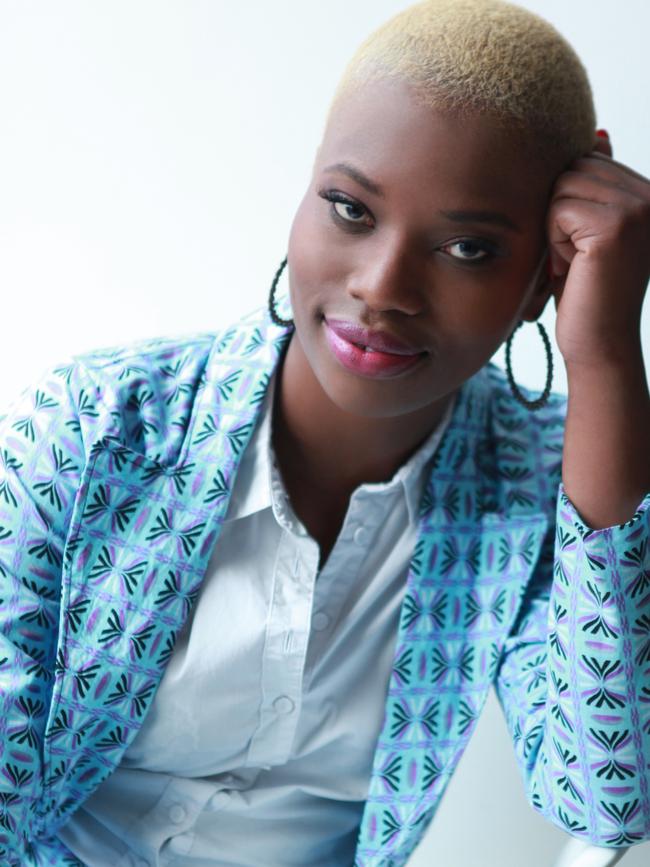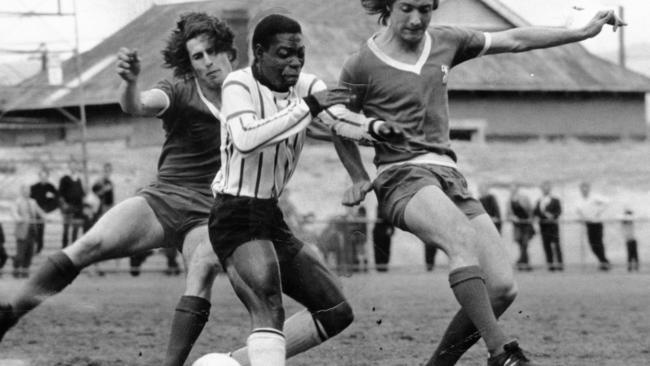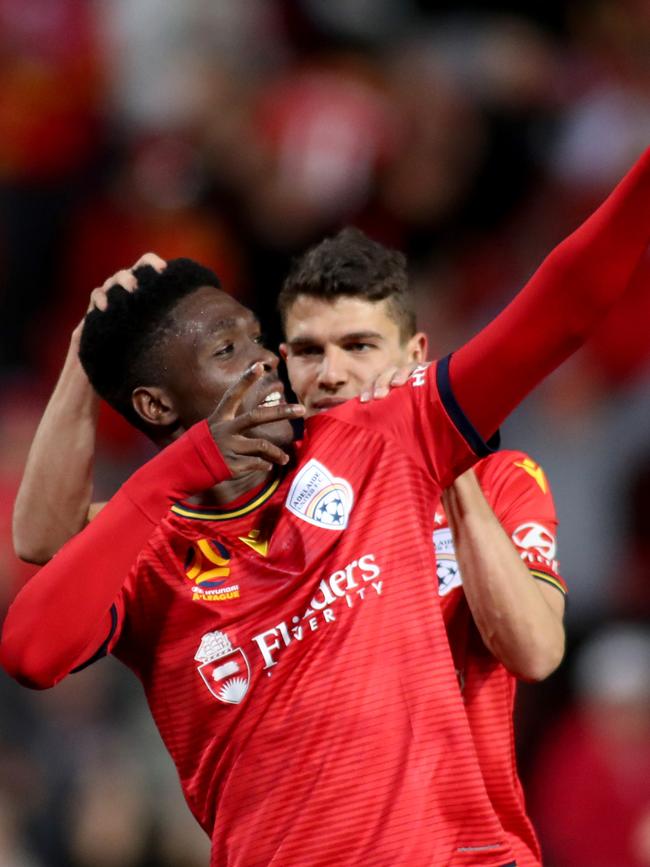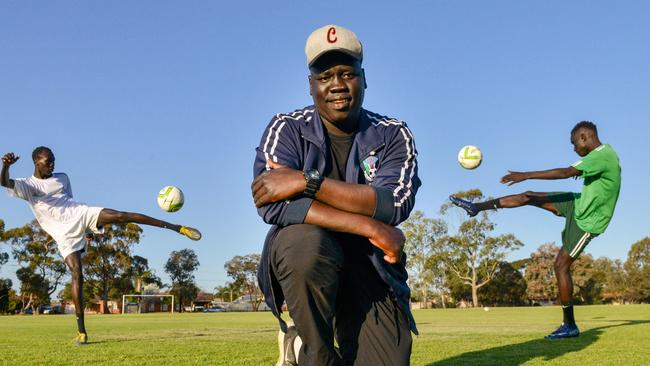The electrifying rise of Adelaide United’s Al Hassan Toure
The rise of Adelaide United’s Al Hassan Toure could have far-reaching effects in both the local African community and beyond.
SA News
Don't miss out on the headlines from SA News. Followed categories will be added to My News.
It’s early days but let’s call it the Al Hassan Toure effect.
The teenager from Guinea with Liberian connections and the magical feet has the capacity to inspire a new generation of football players, both within the state’s African community and beyond.
The day after Toure electrified football fans as he led Adelaide United to back-to-back wins in the FFA Cup final at Hindmarsh Stadium, Adelaide United advisory board member Khadija Gbla was still full of excitement of the moment.
“I was just so proud as an African, as an Australian,’’ she said. But the immediate beneficiary will be her four-year-old son, Samuel.
“I have a four-year-old son and I’m like ‘baby you’re going to be the next Toure. I think we need to practice our kicking more because that is going to be us in a couple of years’.’’
But Gbla, a human rights activist who arrived in Australia as a refugee from Sierra Leone 18 years ago, also sees broader benefits from Toure’s sudden ascent to prominence.
“Out there, he’s an Aussie kid who’s kicking a ball and when he scored, he scored for all Australia.
“It was such a uniting feel, especially in a world we live in where we know Africans are so visual by colour that we get targeted.
“There is discrimination, it still continues to happen, but in that moment, in that sport, Toure was an Aussie. As Aussie as any other person.’’

Gbla isn’t naive enough to believe this sudden adoration of a player like Toure will end racism and discrimination but she says Toure is a “beacon”, not just for young African boys and girls but also for broader Australian society.
“It’s also a great example of how we can bring our African Australian community together to show that we do belong in Australia, that we have something to offer, we really just want a fair go like everyone else.’’
Toure is not the first African refugee to play in the A-League or even for Adelaide. Former Ghanaian international Edson Annan played for Adelaide City in the 1970s. More recently, Mark Ochieng and Awer Mabil played for Adelaide United. Mabil’s ability attracted the attention of FC Midtjylland Denmark’s biggest club, and he is now a regular in the Socceroos’ squad. Hosine Bility, an 18-year-old refugee from Guinea, last month signed a five-year deal with Mabil’s club. But there are still others. Kusini Yengi is in Adelaide’s squad. Thomas Deng plays with Melbourne Victory and Australia. Pacifique Niyongabire is another on Adelaide’s books, while his brother Elvis Kamsoba is with Victory and has also represented Burundi on the international stage. Ruon Tongyik is at the central Coast Mariners, Yaya Dukuly is at Melbourne City, Valentino Yuel is at Western United.

But there is something about Toure’s starburst onto the national consciousness that has grabbed the attention more than any of his predecessors, even Mabil. Perhaps he’s seen as potentially a better player, perhaps it’s because he appears to be such a natural goalscorer and Reds’ fans have been crying out for one of those for years. In football, it’s the goal scorers who grab all the glory. See Cristiano Ronaldo and Lionel Messi.
Arsene Iribuka is the corordinator of SA’s annual African Cup of Nations, which this year attracted 600 male and female players making up 25 teams, says one of the reasons so many African players emerge from Adelaide is that the game has more structure and provides more opportunities in South Australia than is found interstate.
The ACN tournament has become so popular, Iribuka has had to limit the number of interstate players to give preference to local talent.
“We are attached to football and some of these guys don’t want to do anything else,’’ he said.
Iribuka has also worked with Football Federation South Australia to train coaches to a higher standard and with Adelaide United. The best players from the tournament play a game against Adelaide United’s second-tier National Premier League side.
“It’s becoming normal to see our guys go to Adelaide United, before it was unheard of.’’
After the high-profile success of Toure, Iribuka is expecting to see even more talent scouts head to the tournament and he believes there is a host of untapped talent just waiting to be discovered.
At a press conference this week to talk about his exploits, Toure said he hoped his example would encourage others.
“I’m just happy that I’m able to inspire younger kids that didn’t get the opportunity that I got,’’ the 19-year-old said. “There’s been many (African kids) that have come (to SA), but they don’t play because of many reasons or family issues. I just want to show that anything is possible.’’

Toure, like a number of other African players, got his first chance to experience a higher level of football at the Croydon Kings. He made his first team debut in the NPL as a 16-year-old.
Mark Brazzale was the Croydon coach who gave Toure that opportunity and said the young player always had “ability, strength and speed’’.
“The biggest thing was his ability to score goals,’’ he said. But he also encouraged people to “let him breathe and develop’’ and to assess him at the end of the year.
The opportunity the Kings have given to Toure and others will be the key to how many follow in those now famous football boots.
To encourage more kids to play the game, more needs to be done, not only to better define pathways to the top but to provide proper facilities and pitches.
Arok Akoi Arok has been struggling to find a home and a league for his Nile United team and has applied to join the South Australian Amateur League next year. A community club, Nile United was home to players such as Mabil and Thomas Deng before they moved into professional ranks. He wants the club to be a low-cost alternative for players who struggle to pay high fees at FFSA clubs or who find it tough to travel long distances for training and games.
“We have been trying to get fields for five or six years because the demand is there,’’ he said. “We need to create avenues for people to play the sport.’’
He also believes football is a good way for African communities, which have many new arrivals, often from tough and difficult circumstances, to make better connections in the wider Australian community.
Now 24, Arok came to Australia from Kenya as a young boy and played football.
“Growing up, I made a lot of friends playing football and I still have those friends.’’

Adelaide United director, and chairman of the club’s advisory board, Ian Smith, said he would have liked to see more politicians at Hindmarsh on Wednesday night to witness Toure’s impact.
He believes governments need to do more to help support new arrivals to Australia and to give them the tools to help them adapt to their new home. He said that could be as simple as pointing out the closest football club to their new home.
Smith also said football “will connect Australia and Africa’’. Smith regularly visits the continent, he is chairman of the Barefoot to Boots charity, and said football fans across Africa keep a close eye on their compatriots who do well in overseas competitions, including in Australia.
The wave of African migration to Australia over the last decade has been sparked by refugees fleeing life-threatening situations at home. They come to Australia to start a better life with opportunities.
Like almost every new generation of immigration going back a century and more, there have been some who have objected. It was true for the Italians, the Greeks and the Vietnamese. It’s now true for those arriving from Africa. It means some have concentrated on perceived negatives or who latch on to scare stories such as African crime gangs and promote them.
In time, with contributions from people such as Toure, that will fade, as it did with other groups of migrants.
Toure won’t solve racism with a goal, no matter how good it was, but sport does have its own power.
Khadija Gbla is a believer in attacking racism head-on but she knows football can be an effective tool for breaking down barriers.
“It brings so many people together … people can be united in focusing on someone’s talent rather than the colour of their skin.’’
